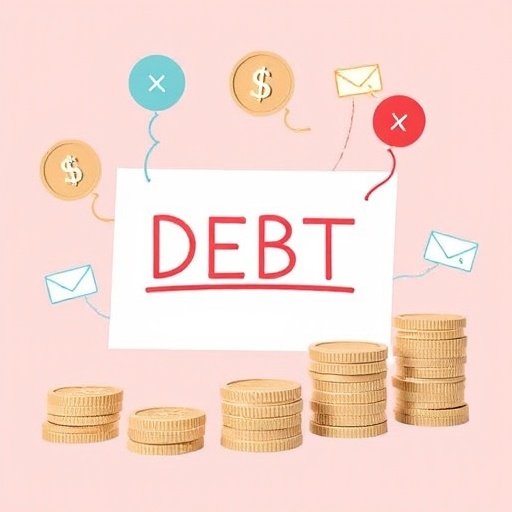Understanding Debt Consolidation: Pros and Cons You Need to Know
In the labyrinthine world of personal finance, debt consolidation stands out as a beacon for many seeking to navigate their way out of a financial quagmire. With the promise of lower interest rates and simplified debt management, it has gained popularity among those burdened with multiple debts. However, like any financial strategy, it comes with its own set of pros and cons. This article will delve into the intricacies of debt consolidation, helping you understand whether it’s a good option for your unique situation.
What is Debt Consolidation and How Does It Work?
Definition of Debt Consolidation
Debt consolidation is the financial strategy of merging multiple debts into a single loan. Imagine your financial obligations as a jigsaw puzzle—debt consolidation allows you to take those seemingly disparate pieces and fit them into one cohesive picture. By consolidating debt, you can simplify your payment process and potentially lower your overall interest rate. It typically involves taking out a new loan, often referred to as a debt consolidation loan, to pay off existing debts such as credit card balances, personal loans, or other types of consumer debt.
How Debt Consolidation Works
So, how does this financial wizardry work? When you get a debt consolidation loan, you use the funds to pay off your existing debts. This single loan replaces multiple payments with one manageable monthly payment. The beauty of this arrangement lies in the potential for a lower interest rate compared to your previous debts. For instance, if you had three credit cards with high-interest rates, consolidating them into a loan with a lower interest rate could free up cash flow, allowing you to pay off your debt faster.
Types of Debt You Can Consolidate
Debt consolidation isn’t a one-size-fits-all solution, but it can be applied to various types of debt. Most commonly, individuals consolidate credit card debt, personal loans, and medical bills. You can also consider consolidating student loans, auto loans, and any other high-interest debt you may have. The key is to identify the type of debt you wish to consolidate and ensure that the new loan terms are favorable compared to your existing obligations.
What Are the Benefits of Debt Consolidation?
Lower Interest Rates with Debt Consolidation Loans
One of the most enticing benefits of debt consolidation is the potential for lower interest rates. If you’ve been juggling high-interest credit card debt, a debt consolidation loan may offer a much lower interest rate, which can save you money in the long run. It’s a good way to save on interest payments, allowing you to allocate more funds toward paying down the principal balance of your debt. A lower interest rate means more of your monthly payment goes toward reducing your actual debt rather than being swallowed by interest fees.
Improved Monthly Payment Terms
Debt consolidation can also lead to improved monthly payment terms. Instead of dealing with multiple creditors each month, you’ll only have to keep track of one payment. This streamlined approach not only simplifies your debt management but can also help you avoid missed payments, which can hurt your credit score. With a single monthly debt payment, you can better manage your budget and set aside funds for other financial goals.
Streamlined Debt Management
Let’s face it: keeping track of multiple debts can feel like being a juggler in a circus. Debt consolidation makes it easier to manage your finances by providing a clear view of your total debt and a defined repayment plan. This streamlined management can reduce stress, enabling you to focus on other important aspects of your life. It’s like having a financial GPS that guides you on the fastest route to financial freedom.
What Are the Drawbacks of Debt Consolidation?
Potential to Hurt Your Credit Score
While debt consolidation has its perks, it’s essential to acknowledge the drawbacks. One significant concern is the potential to hurt your credit score. When you apply for a new loan, lenders will conduct a hard inquiry on your credit report, which could temporarily lower your credit score. Additionally, if you consolidate your debt but continue to rack up more credit card debt, you may find yourself in a worse financial situation than before. It’s crucial to maintain good credit habits even after consolidating.
Fees and Costs Associated with Consolidation Loans
Another drawback of debt consolidation is the potential for hidden fees. Some lenders may charge origination fees, closing costs, or prepayment penalties. These costs can eat into the savings you hoped to achieve through lower interest rates. Before you get a debt consolidation loan, it’s wise to review all associated costs and factor them into your decision-making process. After all, a loan that seems like a great deal on paper may not be so appealing once you account for extra fees.
Risk of Accumulating More Debt
Perhaps the most insidious danger of debt consolidation lies in the risk of accumulating more debt. It’s all too easy to feel a sense of relief after consolidating your debts and then fall back into old habits. If you don’t change your spending behaviors, you might find yourself in a cycle of debt once again. The key to successful debt management is not only consolidating but also adopting a frugal mindset and sticking to a budget that prioritizes debt repayment.
How Does Debt Consolidation Affect Your Credit Score?
Understanding Credit Utilization
Your credit score is like a report card for your financial health, and debt consolidation can influence it in various ways. One critical factor is credit utilization, which is the ratio of your credit card balances to your available credit. When you consolidate debt and close old credit accounts, your total available credit decreases, potentially increasing your credit utilization ratio. This shift can negatively impact your credit score, so it’s vital to consider how consolidation might affect this aspect of your credit history.
Short-Term vs. Long-Term Credit Impact
The impact of debt consolidation on your credit score can also vary between the short-term and the long-term. Initially, your score may dip due to hard inquiries and changes in credit utilization. However, over time, if you make consistent payments on your consolidation loan and maintain low credit card balances, your credit score could improve. It’s a bit like planting a garden: the initial digging may seem disruptive, but with time and care, you can cultivate a flourishing financial future.
How to Minimize Negative Effects on Your Credit
To minimize the negative effects on your credit, consider a few strategic moves. First, try to keep old credit accounts open, even if you’re no longer using them. This approach can help maintain a higher total credit limit and lower your credit utilization ratio. Additionally, make all your payments on time and avoid accumulating new debt. By managing your debts responsibly after consolidation, you can protect your credit score and pave the way for a more stable financial future.
Is Debt Consolidation a Good Option for You?
Evaluating Your Current Debt Situation
Before diving into debt consolidation, it’s essential to evaluate your current debt situation. What types of debts do you have? Are they high-interest debts that could benefit from consolidation? Take a close look at your overall financial picture, including your income, expenses, and payment habits. This evaluation will help you determine if debt consolidation is a good option for you. It’s like assessing the weather before planning a picnic; you want to ensure the conditions are just right.
Using a Debt Consolidation Calculator
To further aid your decision, consider using a debt consolidation calculator. These handy tools can help you estimate potential monthly payments and interest savings based on your current debt. By inputting your existing debts, interest rates, and desired loan terms, you can get a clearer picture of how debt consolidation may impact your finances. It’s a bit like having a financial crystal ball, revealing what lies ahead if you choose to consolidate your debt.
When to Consider Debt Consolidation
Timing is everything, and knowing when to consider debt consolidation can significantly affect your financial trajectory. If you’re overwhelmed by high-interest credit card debt, struggling to keep up with multiple payments, or simply seeking a more manageable repayment plan, it may be time to explore consolidation options. However, before jumping in, ensure you have a plan in place to avoid falling back into debt. After all, the goal is to not only consolidate but to conquer your financial challenges once and for all.
Understanding Debt Consolidation: Pros and Cons You Need to Know
Debt consolidation is a term that many individuals encounter as they navigate the treacherous waters of finance. Whether you’re drowning in credit card debt or struggling under the weight of a personal loan, understanding the ins and outs of debt consolidation could be your lifeline. In this article, we’ll explore what debt consolidation is, the benefits that may come with it, the potential drawbacks you need to watch out for, and whether it’s a good option for you. So, grab a cup of coffee, and let’s dive into the world of debt consolidation!
What is Debt Consolidation and How Does it Work?
What Types of Debt Can You Consolidate?
Debt consolidation isn’t just a one-size-fits-all solution; it can be tailored to various types of debt. You can consolidate credit card debt, personal loans, and even medical bills. If you have multiple high-interest debts, like three credit cards with varying balances, consolidating them into one manageable loan could make your financial life a whole lot easier. By focusing on consolidating existing debt, you can streamline your monthly payment and potentially lower your interest rate.
How Does Debt Consolidation Work?
The mechanics of debt consolidation are as simple as pie—provided you don’t have a gluten allergy. In essence, you take out a new loan, often called a debt consolidation loan, to pay off your existing debts. This process allows you to consolidate your debt into a single monthly payment, which can sometimes come with a lower interest rate. It’s like getting a new lease on life for your financial situation—one where you can breathe a little easier each month. Remember, though, the key to successful consolidation is securing a loan with favorable terms that won’t hurt your credit score in the long run.
What is a Debt Consolidation Loan?
A debt consolidation loan is a financial tool used to combine multiple debts into one single loan. This type of loan may come in various forms, including personal loans or even balance transfer credit cards that offer low or zero introductory interest rates. By obtaining a debt consolidation loan, you can pay off high-interest debt and replace it with a new loan that ideally has a lower interest rate. This strategic move not only simplifies your payments but can also help you manage your credit utilization ratio—essential for maintaining a good credit score.
What are the Benefits of Debt Consolidation?
How Can Debt Consolidation Lower Your Monthly Payments?
One of the most appealing benefits of debt consolidation is the potential to lower your monthly payments. By consolidating high-interest debt, you could end up with a new loan that has a significantly lower interest rate. This means less money going to interest and more money in your pocket—sounds like a win-win, right? Lower monthly payments can ease financial stress and allow you to allocate funds toward savings, investments, or, dare we say, a well-deserved vacation.
Can Debt Consolidation Help You Pay Off Debt Faster?
Debt consolidation can indeed help you pay off your debt faster, provided you play your cards right. By consolidating your debt into a single loan with a lower interest rate, you can direct more of your monthly payment toward the principal, effectively reducing the amount of time it takes to become debt-free. Moreover, with fewer bills to manage, you’re less likely to miss payments, thus avoiding late fees and penalties that can slow down your progress. It’s like having a personal trainer for your finances—pushing you to reach that debt-free finish line!
Will Debt Consolidation Improve Your Credit Score?
Ah, the million-dollar question: will debt consolidation improve your credit score? The answer is a bit nuanced. In the short term, taking out a debt consolidation loan could hurt your credit score due to the hard inquiry on your credit report and the new credit account. However, if you manage the loan wisely—making timely payments and maintaining a low credit utilization ratio—your score may improve over time. In essence, debt consolidation makes it possible to rehabilitate your credit score, as long as you’re committed to responsible financial habits.
What are the Drawbacks of Debt Consolidation?
Ah, debt consolidation—the shiny knight in armor that promises to rescue you from the dragon of financial chaos! At first glance, it seems like it’s a good idea, combining all your pesky debts into one manageable lump. However, before you start to serenade your new loan, let’s not forget that traditional debt consolidation comes with its own quirky baggage. For starters, if you opt for a loan or balance transfer credit, your credit score could suffer during the process. Yes, folks, that hard credit inquiry can sting more than a bee on a bad day!
Moreover, the impact on your credit can be a double-edged sword. Sure, your monthly payments might be lower, but if you’re not careful, you could end up with a lovely new mess to clean up. So, while debt relief strategies are like a buffet of options, make sure you don’t leave the table with more than you bargained for. After all, no one wants a debt hangover, right?
Can Debt Consolidation Hurt Your Credit Score?
While debt consolidation can provide numerous benefits, it’s crucial to consider the potential drawbacks as well. As previously mentioned, debt consolidation could initially hurt your credit score due to new credit inquiries and changes in your credit utilization ratio. If you’re not careful, you may find yourself in a worse credit situation than before. It’s essential to evaluate your credit history and current financial standing before diving into consolidation.
What are the Potential Fees Involved?
Let’s not forget about the pesky fees that can accompany debt consolidation. Whether you’re looking to get a debt consolidation loan or a balance transfer credit card, potential fees such as origination fees, balance transfer fees, and even annual fees can eat into your savings. Be sure to read the fine print and weigh these costs against the benefits of lower monthly payments or a reduced interest rate. Transparency is key, folks—don’t let hidden fees catch you off guard!
Are There Risks of Accumulating More Debt?
One of the most significant risks associated with debt consolidation is the temptation to rack up even more debt. Once you pay off your credit card balances with a new loan, the allure of those now-empty credit cards might lead you to start swiping again. This can create a nasty cycle of debt accumulation that defeats the purpose of consolidation. It’s vital to exercise discipline and consider establishing a budget to prevent falling into the same trap again.
How to Consider Debt Consolidation: Is it a Good Option for You?
What Factors Shoul
Considering debt consolidation? Well, it might just be a good idea if you find yourself drowning in a sea of high-rate credit card debt. Imagine trading in those pesky plastic monsters for one new loan that’s more manageable. But before you dive in, take a hard look at your credit score, especially if it’s taken a hit due to those low credit score blues. You don’t want your credit score to suffer even more—after all, percent of your credit score can be impacted by your debt balance.
If you’re thinking about using debt consolidation as a means to pay off the debt, consider factors like the amount of debt you’re facing and whether it’s worth swapping credit card to consolidate a smattering of bills, including medical debt, into a single, less daunting payment. Enrolling in a debt repayment plan can be a solid move, but beware of the temptation to add debt elsewhere while you’re at it. If it feels like a sign that consolidation makes sense, then embrace it—but do it wisely!
d You Evaluate Before Consolidating Debt?
Before you rush into consolidating your debt, take a moment to evaluate your financial situation. Consider factors such as your current interest rates, monthly payments, and credit score. Are you in a position to qualify for a loan with a lower interest rate? Additionally, assess your spending habits and determine if you’re financially ready to commit to a new loan. This evaluation process can help clarify whether debt consolidation is a good option for you.
How to Use a Debt Consolidation Calculator?
A debt consolidation calculator can be a valuable tool in your decision-making arsenal. By inputting your existing debt amounts, interest rates, and potential new loan terms, you can visualize how consolidation might impact your monthly payments and overall financial picture. It’s like having a crystal ball for your finances! By comparing different scenarios, you can make a more informed choice about whether to consolidate your debt or consider other options.
When Should You Consider Debt Consolidation?
Timing is everything in life, and the same goes for debt consolidation. Ideally, you should consider consolidating your debt when you have multiple high-interest debts, are struggling to make minimum payments, or have a good credit score that could qualify you for favorable loan terms. If you’re feeling overwhelmed by your monthly debt payment or want to simplify your financial obligations, it may be time to consider debt consolidation as a viable option.
What Are the Alternatives to Debt Consolidation?
So, you’re contemplating debt consolidation, but have you considered the cons of debt consolidation? Sure, it might seem like a breeze, but if your current credit score is already hanging by a thread, a consolidation loan or balance transfer could send your credit score negatively plummeting. Yikes! Instead of chasing the elusive dream of a lower loan amount and term, why not explore alternatives? For instance, a good old-fashioned budget might help your credit score more than you think. Paying off that old debt chunk by chunk could actually help your credit score instead of a shiny new loan or credit card that could add to your debt load and stress levels.
If you’re feeling adventurous, consider negotiating directly with your creditors. Believe it or not, they might prefer a friendly chat over a debt consolidation company taking their pie. And let’s be honest, sometimes consolidating your credit card debt just seems like a fancy way to shuffle cards around without really addressing the issue. So, instead of falling for the charm of that consolidation loan with a lower interest rate, roll up your sleeves and tackle that debt more quickly with some good old-fashioned elbow grease. After all, taking control of your finances might actually be a good idea!
How Does Debt Management Compare to Debt Consolidation?
Debt management is another strategy that can help you tackle your financial burdens, and it differs significantly from debt consolidation. While consolidation combines your debts into one loan, debt management often involves working with a credit counseling agency to create a personalized repayment plan. This plan may include negotiating lower interest rates with creditors or establishing a budget to help you pay off your debt over time. Each approach has its benefits and drawbacks, so it’s essential to weigh your options carefully.
What Other Debt Relief Options are Available?
Aside from debt consolidation and management, there are other debt relief options worth considering. Options like debt settlement, bankruptcy, or even working out a payment plan directly with creditors can help alleviate financial pressure. Each of these methods comes with its own risks and benefits, and it’s crucial to do thorough research to determine which path aligns with your financial goals.
When Should You Seek Professional Help?
Sometimes, the best way to navigate the complex world of debt is to seek professional help. If you’re feeling overwhelmed, confused, or unsure about your financial situation, consulting a credit counselor or financial advisor can provide clarity. These professionals can offer tailored advice, help you understand your options, and guide you toward a more secure financial future. Remember, asking for help is a sign of strength—not weakness!





